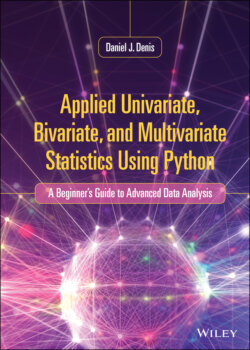Читать книгу Applied Univariate, Bivariate, and Multivariate Statistics Using Python - Daniel J. Denis - Страница 19
1.5 Essential Philosophical Principles for Applied Statistics
ОглавлениеAs already briefly discussed, one reason why many students (especially those outside of the mathematical sciences) have an initial disdain for learning statistics is that they have the impression that statistics is mathematics, and since they dislike mathematics, they naturally believe they will dislike statistics. However, it is important to realize that statistics is not mathematics. Even a deeply mathematical version of statistics (the so-called field of mathematical statistics) is still, by itself, not mathematics! It is statistics, first and foremost. The range of mathematics used in the communication of statistical concepts varies greatly from source to source, just as it does from course to course in college. An analogy can be drawn to physics. Physics itself is not mathematics. Mathematics, however, is the most useful vehicle for communicating ideas in physics. For instance, the idea of the instantaneous rate of change is not, by itself, mathematics. However, it is very well defined in mathematics as the derivative. Historically it began as a concept, and evolved eventually over thousands of years into a mathematical expression so we could actually work with the philosophical concept. If this challenges your view on what mathematics actually is, that is a good thing! Most people who do not know better associate mathematics with numbers and equations. Yes, it’s that too, but it’s so much more. It is not number-crunching, it is a discipline of concepts rigorized for the sake of communication and manipulation, and agrees a lot (but not always) with the physical world.
Even more important than essential mathematics is probably the essential philosophical principles that underlie scientific and statistical analyses. You may ask what on earth a discussion of philosophy has to do with statistics and science? Everything! Now, I am not talking about the kind of philosophy where we question who we are and the meaning of life, lay in bed as Descartes did, and eventually conclude “I think, therefore I am,” wear a robe, smoke a pipe, and contemplate our own existences. Most empirically-trained scientists are practicing an empirical philosophy. Philosophy is at the heart of all scientific and non-scientific disciplines. “Philosophy of science” is a branch of philosophy that, loosely put, surveys the assumptions of science and what it means to establish evidence in the sciences. Translated, it means “thinking about what you are doing, rather than just doing it.” Philosophy of science asks questions such as the following:
What does it mean to establish scientific evidence and why is scientific evidence so valued vs. other forms of evidence?
Why is the experiment usually considered the gold-standard of scientific evidence, and why is correlational research often not nearly as prized?
Why is science inductive rather than deductive? What are some of the problems associated with induction that make drawing scientific conclusions so difficult?
Is establishing causation possible, and if so, what does it mean to establish it?
Why has science adopted a statistical approach to establishing evidence in most of its fields? What is so special about the statistical approach? If statistics can be so misleading, would we be better off not using them at all? Does the use of statistics advance science or hinder it?
Do multivariate statistics help clarify or otherwise confuse and impede the search for scientific evidence? Do procedures such as factor analysis actually advance the cause of science or delay it due to its problematic issues? Does “finding” a cluster in cluster analysis provide evidential support for real, substantive clusters? Or, does it simply provide evidence of clusters on an abstract mathematical level?
For the conscientious reader, it does not take long to realize that the above questions are important ones to answer if one is to make any sense of the scientific evidence they have obtained from their own study of nature. Now, for relatively simple experiments with non-controversial variables, philosophical issues do not arise as much, if at all. For instance, correlating heart rate with blood pressure does not typically require extensive philosophical examination of underlying methodology. It is an easy correlation on non-controversial variables. This is why biological sciences are often considered “harder” than the softer sciences, not in their level of difficulty necessarily, but because it is generally much easier to establish convincing evidence in those sciences. A cure for COVID-19 is difficult to come by, but once it does arrive, we can visually observe people living longer who once had the disease. In some areas of social science, however, including fields such as economics, psychology, etc., establishing evidence is much harder, simply because the matter under investigation does not lend itself to such neat and nice definition and experimentation. That is, establishing convincing evidence in such fields is often quite complex, especially if non-experimental methods are used on variables for which measurement and even “existence” can be controversial. You can correlate depression with anxiety all you like, but you should also first be able to defend the idea that asking people about their depression symptoms on a questionnaire is actually a reasonable or valid way to measure something called “depression.” Some would say it is not, and that self-report is a very weak way to establish evidence of anything other than, well, the self-report of what people say! Hence, finding that depression is linked to overall well-being (or lack thereof), for example, means little if we first do not agree on how these constructs are defined and measured.
Other issues that at first glance might appear purely “mathematical” have groundings in philosophical principles. For example, whether a research variable should be considered continuous or discrete in a scientific sense cannot be answered via mathematics; it must be answered through thoughtful consideration in a philosophical or scientific sense. We survey this issue now.
